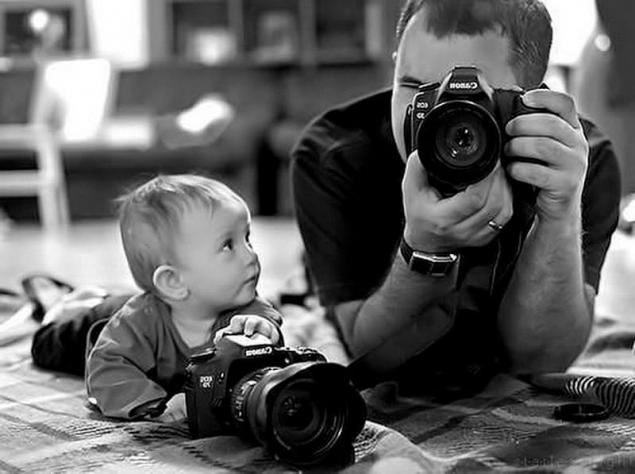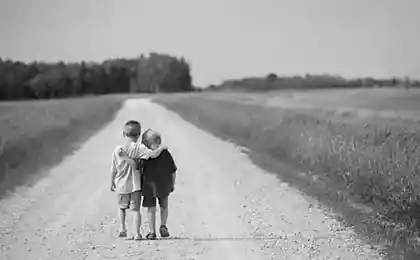400
How do we make our children losers
1. "At your age I knew how to do it"
It is not necessary to focus on your excellence, to emphasize that you are something easier to attain.
You and your baby ‒ not rivals. The child understands that you are stronger and can do more things because you are an adult, he wants to learn, to imitate you, to become "like dad."
If you are stronger, smarter, more capable has always been, even when I wasn't an adult, then the child can fold and lose hope eventually catch up to you. Tell your child exactly how you achieved your success, what challenges were faced, what feelings are experienced.
This will bring you closer together and inspire baby's pride in you and faith in yourself.

2. "Don't bring a toy to daycare, you lose"
Use "I-messages" to warn the kid about the possible risks or consequences of his actions. In this form they do not sound insulting for a child, because you talk about your feelings, not about his faults.
To paraphrase: "I suggest to leave a toy in the car – I'm afraid that at school it may be lost. What do you think about this?"
3."You don't have this ability"
"He's unmusical";
"Did you get so unsportsmanlike?";
"Yeah, the artist doesn't leave you"...
We often don't think about the devastating consequences of such review. Often the disappointment of the parents was a desire to see the child first, the best around.
If the child has not, in the opinion of the parents, extraordinary ability, it is better to keep him away from those activities where it won't "Shine". Meanwhile, children's clubs and clubs are not just for geniuses and Champions!
If the kid is fun to do, he takes pleasure in, do not deprive the child of hope, give him a chance to try their hand again and again.
4."You will know when you grow up"
If a child hears this answer continuously, after a while it really stops bothering parents with questions.
In addition, the baby may develop a mystical idea about the origins of knowledge: people automatically know everything in the world, after reaching a certain age (or even growth). So, to be smart, you just have to wait and not to study the encyclopedia.
To support curiosity, to stimulate interest in world needs. If you don't know the answer to the question, to be honest about it. Promise that together we will find the answer in books or on the Internet – and keep your promise.
To paraphrase: "So, are you interested in space? Great! You asked a difficult question, without training it is difficult for me to answer. Tonight ask your dad. And, you can go to the library..."

©Magdalena Berny
5."You're messing with my mind!"
Saying that, you, first, painted in his own impotence and incompetence, and secondly, to impose to the child the responsibility for your condition.
It is unlikely that your fatigue and irritation only blame the baby...
If you are feeling "on the brink", you should not pretend you, and start a noisy game with the child. To be honest with the kid – not bad. You have the right to fatigue, sadness and even anger. Better to send baby to the nursery for a time out or a time out for yourself than to the last "keep face" and in the end explode.
To paraphrase: "I've had a hard day, I need to rest. Can quietly play in his room? And later we'll drink cocoa and read a tale."
6."What are you, deaf?"
Sarcasm, in contrast to the humour as an educational technique is very dangerous ‒ first of all what destroys good relationships, creates a barrier of misunderstanding. The child may not look offended, but it doesn't mean that sarcastic remark didn't bother him.
Kids tend to take the meaning literally. Saying "Your place is a pigsty!" or "you Have no brains!", you can seriously scare a child.
Older children, who are often ridiculed, become withdrawn, anxious, insecure. Sarcasm, evil taunts are no less devastating than other types of aggression, therefore, in dealing with the child is better to abandon them altogether.
You will appreciate this gesture of goodwill when the child reaches adolescence.
7."I'm sick of you"
This phrase sounds crass and demeans the child.
Children do sometimes bring us to a white heat, and emotions erupt out of control. But actually we are not powerless in the face of this wild force. We can learn not to lose ourselves – if we learn to recognize and acknowledge your feelings.
"I'm angry" "I am very much afraid!", "I am very sorry!" ‒ speaking of myself, of my own state, we are regaining yourself and get a chance to avoid death and destruction.published
P. S. And remember, only by changing their consumption — together we change the world! ©
Source: www.facebook.com/pereval.org/posts/1242323202471351:0
It is not necessary to focus on your excellence, to emphasize that you are something easier to attain.
You and your baby ‒ not rivals. The child understands that you are stronger and can do more things because you are an adult, he wants to learn, to imitate you, to become "like dad."
If you are stronger, smarter, more capable has always been, even when I wasn't an adult, then the child can fold and lose hope eventually catch up to you. Tell your child exactly how you achieved your success, what challenges were faced, what feelings are experienced.
This will bring you closer together and inspire baby's pride in you and faith in yourself.

2. "Don't bring a toy to daycare, you lose"
Use "I-messages" to warn the kid about the possible risks or consequences of his actions. In this form they do not sound insulting for a child, because you talk about your feelings, not about his faults.
To paraphrase: "I suggest to leave a toy in the car – I'm afraid that at school it may be lost. What do you think about this?"
3."You don't have this ability"
"He's unmusical";
"Did you get so unsportsmanlike?";
"Yeah, the artist doesn't leave you"...
We often don't think about the devastating consequences of such review. Often the disappointment of the parents was a desire to see the child first, the best around.
If the child has not, in the opinion of the parents, extraordinary ability, it is better to keep him away from those activities where it won't "Shine". Meanwhile, children's clubs and clubs are not just for geniuses and Champions!
If the kid is fun to do, he takes pleasure in, do not deprive the child of hope, give him a chance to try their hand again and again.
4."You will know when you grow up"
If a child hears this answer continuously, after a while it really stops bothering parents with questions.
In addition, the baby may develop a mystical idea about the origins of knowledge: people automatically know everything in the world, after reaching a certain age (or even growth). So, to be smart, you just have to wait and not to study the encyclopedia.
To support curiosity, to stimulate interest in world needs. If you don't know the answer to the question, to be honest about it. Promise that together we will find the answer in books or on the Internet – and keep your promise.
To paraphrase: "So, are you interested in space? Great! You asked a difficult question, without training it is difficult for me to answer. Tonight ask your dad. And, you can go to the library..."

©Magdalena Berny
5."You're messing with my mind!"
Saying that, you, first, painted in his own impotence and incompetence, and secondly, to impose to the child the responsibility for your condition.
It is unlikely that your fatigue and irritation only blame the baby...
If you are feeling "on the brink", you should not pretend you, and start a noisy game with the child. To be honest with the kid – not bad. You have the right to fatigue, sadness and even anger. Better to send baby to the nursery for a time out or a time out for yourself than to the last "keep face" and in the end explode.
To paraphrase: "I've had a hard day, I need to rest. Can quietly play in his room? And later we'll drink cocoa and read a tale."
6."What are you, deaf?"
Sarcasm, in contrast to the humour as an educational technique is very dangerous ‒ first of all what destroys good relationships, creates a barrier of misunderstanding. The child may not look offended, but it doesn't mean that sarcastic remark didn't bother him.
Kids tend to take the meaning literally. Saying "Your place is a pigsty!" or "you Have no brains!", you can seriously scare a child.
Older children, who are often ridiculed, become withdrawn, anxious, insecure. Sarcasm, evil taunts are no less devastating than other types of aggression, therefore, in dealing with the child is better to abandon them altogether.
You will appreciate this gesture of goodwill when the child reaches adolescence.
7."I'm sick of you"
This phrase sounds crass and demeans the child.
Children do sometimes bring us to a white heat, and emotions erupt out of control. But actually we are not powerless in the face of this wild force. We can learn not to lose ourselves – if we learn to recognize and acknowledge your feelings.
"I'm angry" "I am very much afraid!", "I am very sorry!" ‒ speaking of myself, of my own state, we are regaining yourself and get a chance to avoid death and destruction.published
P. S. And remember, only by changing their consumption — together we change the world! ©
Source: www.facebook.com/pereval.org/posts/1242323202471351:0























